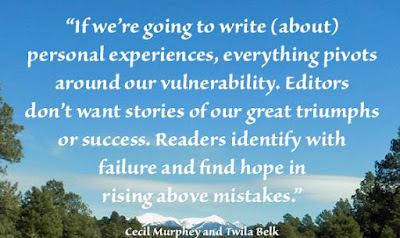Before you publish
your memoir, analyze the quality of your writing. You’ll probably need to polish
your skills in the craft and art of writing. To help you with that task, today
we’ll look at how to fashion your sentences.
First, let’s
acknowledge this:
“Very few sentences
come out right the first time,
or even the second
or third time.”
(William Zinsser, Writing About Your Life)
As you write,
believe this:
Even pros and
experienced writers
revise their
sentences numerous times.
For the sake of your
readers, commit to crafting good sentences. Why? First, you want readers to
enjoy your story and, second, you also want them to understand your message.
“Just as there are
arts of weaving and fly-fishing and dancing, so there are arts of sentence
making,” write Collette and Johnson, authors of Finding Common Ground, A Guide to Personal, Professional, and Public Writing.
“. . . Writing is a
partnership with the reader. . . . The way you put your stories together counts
a good deal toward how your reader will understand what you say.
“You can . . .
arrange, rearrange, or prearrange them to suit particular purposes.
“The writer shapes
the sentence to indicate how readers should construe the meaning . . . . Building
a sentence, then, is a way of defining and specifying meaning, of focusing a
reader’s attention. . . .” (Collette and Johnson, Finding Common Ground;
emphasis mine)
As we begin to
scrutinize sentences, Bill Roorback points out that “sentences are a little
like purses: They come in various sizes and can hold a little or a lot.” (Writing Life Stories)
So, let’s start by
looking at those of the smaller size:
Short sentences:
“ . . . In artful
prose, [sentence] length is controlled and varied. Some stylists write short
sentences to strike a note of urgency.” (Joseph F. Williams, Style: Ten Lessons in Clarity and Grace)
“ . . . Short sharp
sentences increase tension in a scene.” (Lynda R. Young)
For example, here’s
how Kristen Welch writes short sentences to express tension and urgency:
“She came to us
alone, with a baby she didn’t want stirring in her womb.
“Orphaned at a young
age, she wandered this earth unloved and unwanted.
“Charity came to us
broken, detached, angry.
“Outwardly she
pushed others away, isolating herself through pain, distancing her heart from
love.
“But we loved her anyway.
We set firm boundaries and we loved. We prayed. We fasted. We begged God to
draw her close. We shed so many tears over this child having a child.
“We feared for her
unborn son. How would this detached girl attach to a baby she never wanted?
“He was born to an
angry mother. She didn’t want him.
“And we didn’t know
what to do. . . .” (Kristen Welch, We Are THAT family)
Sentence fragments:
Consider writing
short sentences here and there in your vignettes, but also think about writing sentence
fragments—incomplete sentences and thoughts.
Grammatically,
sentence fragments are incorrect, but “There are occasions when a sentence
fragment can be stylistically effective, exactly what you want and no more.
‘Harrison Ford has said that he would be more than willing to take on another
Indiana Jones project. In a New York Minute.’ As long as you are clearly in
control of the situation, this is permissible, but [doing so] depends on the
circumstances.” (CCC Foundation, emphasis mine)
Breaking the rules
occasionally with sentence fragments can
add punch to your writing. Or sizzle. Or grief.
Next week we’ll look
at long sentences
but for now, examine
your rough drafts
and look for sentences
that need a little spiffing up.
Where can you write
“quick, breathless utterances” (Williams),
like Kristen Welch
did, to create tension,
urgency, drama, or
emotion?
Where might sentence
fragments
work even more
effectively than complete sentences?
And throughout, ask
yourself:
Will readers
understand
what I’m trying to
get across?
Have I written each
sentence clearly?
And remember, rewriting is not punishment.
(Smile!)








